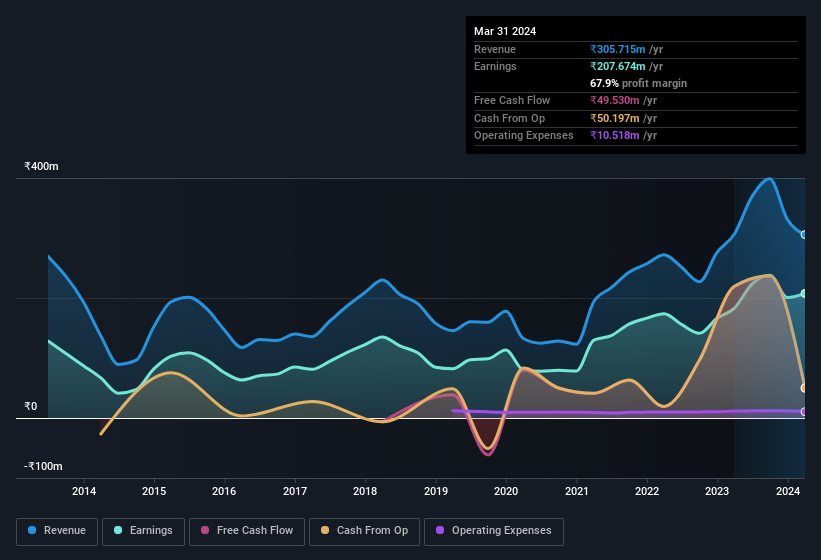- India
- /
- Construction
- /
- NSEI:CORALFINAC
Concerns Surrounding Coral India Finance and Housing's (NSE:CORALFINAC) Performance

The market shrugged off Coral India Finance and Housing Limited's (NSE:CORALFINAC) solid earnings report. We did some digging and believe investors may be worried about some underlying factors in the report.
See our latest analysis for Coral India Finance and Housing

A Closer Look At Coral India Finance and Housing's Earnings
In high finance, the key ratio used to measure how well a company converts reported profits into free cash flow (FCF) is the accrual ratio (from cashflow). The accrual ratio subtracts the FCF from the profit for a given period, and divides the result by the average operating assets of the company over that time. The ratio shows us how much a company's profit exceeds its FCF.
As a result, a negative accrual ratio is a positive for the company, and a positive accrual ratio is a negative. While having an accrual ratio above zero is of little concern, we do think it's worth noting when a company has a relatively high accrual ratio. That's because some academic studies have suggested that high accruals ratios tend to lead to lower profit or less profit growth.
For the year to March 2024, Coral India Finance and Housing had an accrual ratio of 0.21. We can therefore deduce that its free cash flow fell well short of covering its statutory profit. To wit, it produced free cash flow of ₹50m during the period, falling well short of its reported profit of ₹207.7m. Coral India Finance and Housing's free cash flow actually declined over the last year, but it may bounce back next year, since free cash flow is often more volatile than accounting profits. The good news for shareholders is that Coral India Finance and Housing's accrual ratio was much better last year, so this year's poor reading might simply be a case of a short term mismatch between profit and FCF. Shareholders should look for improved cashflow relative to profit in the current year, if that is indeed the case.
Note: we always recommend investors check balance sheet strength. Click here to be taken to our balance sheet analysis of Coral India Finance and Housing.
Our Take On Coral India Finance and Housing's Profit Performance
Coral India Finance and Housing didn't convert much of its profit to free cash flow in the last year, which some investors may consider rather suboptimal. Therefore, it seems possible to us that Coral India Finance and Housing's true underlying earnings power is actually less than its statutory profit. But at least holders can take some solace from the 60% per annum growth in EPS for the last three. The goal of this article has been to assess how well we can rely on the statutory earnings to reflect the company's potential, but there is plenty more to consider. Keep in mind, when it comes to analysing a stock it's worth noting the risks involved. Be aware that Coral India Finance and Housing is showing 4 warning signs in our investment analysis and 1 of those is a bit concerning...
This note has only looked at a single factor that sheds light on the nature of Coral India Finance and Housing's profit. But there are plenty of other ways to inform your opinion of a company. For example, many people consider a high return on equity as an indication of favorable business economics, while others like to 'follow the money' and search out stocks that insiders are buying. While it might take a little research on your behalf, you may find this free collection of companies boasting high return on equity, or this list of stocks with significant insider holdings to be useful.
New: AI Stock Screener & Alerts
Our new AI Stock Screener scans the market every day to uncover opportunities.
• Dividend Powerhouses (3%+ Yield)
• Undervalued Small Caps with Insider Buying
• High growth Tech and AI Companies
Or build your own from over 50 metrics.
Have feedback on this article? Concerned about the content? Get in touch with us directly. Alternatively, email editorial-team (at) simplywallst.com.
This article by Simply Wall St is general in nature. We provide commentary based on historical data and analyst forecasts only using an unbiased methodology and our articles are not intended to be financial advice. It does not constitute a recommendation to buy or sell any stock, and does not take account of your objectives, or your financial situation. We aim to bring you long-term focused analysis driven by fundamental data. Note that our analysis may not factor in the latest price-sensitive company announcements or qualitative material. Simply Wall St has no position in any stocks mentioned.
About NSEI:CORALFINAC
Coral India Finance and Housing
Provides investment services in the in India.
Flawless balance sheet average dividend payer.
Market Insights
Community Narratives



